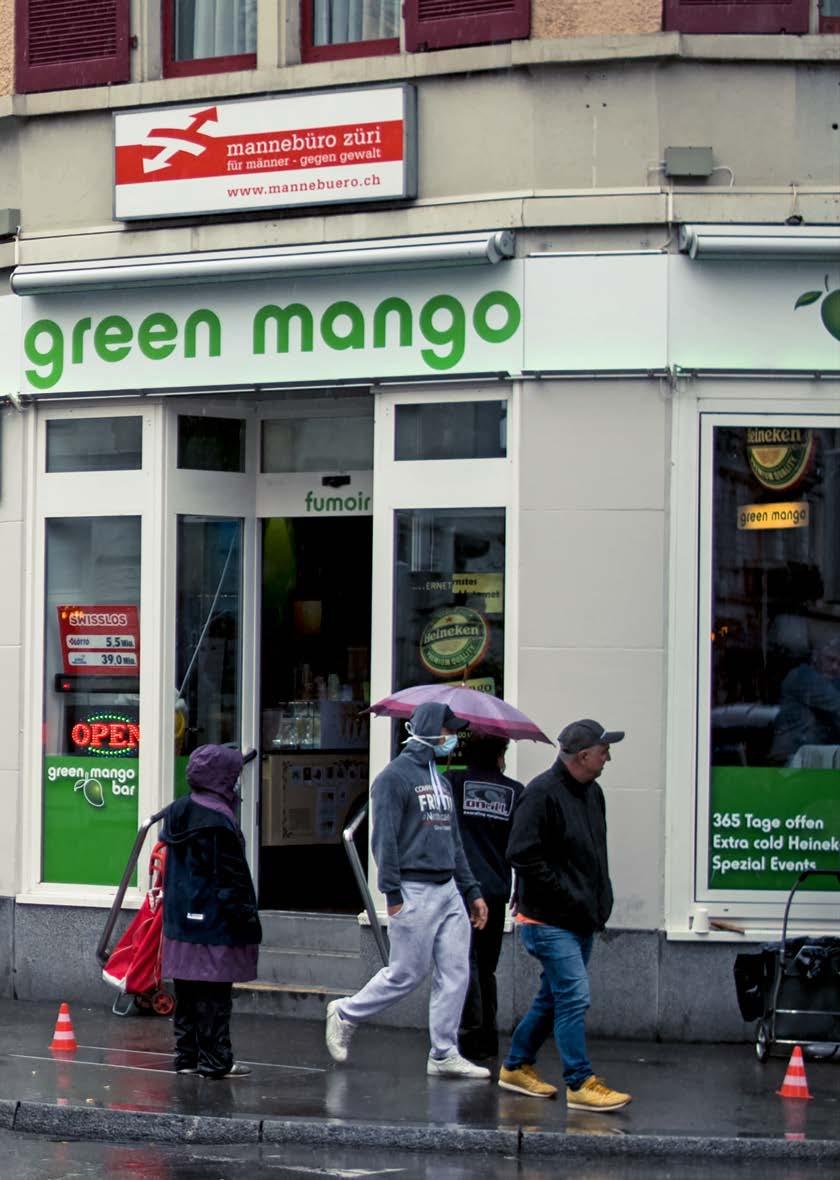
27 minute read
Activities in Switzerland
Caritas’ largest relief effort in Switzerland
Since the start of the coronavirus pandemic in March 2020, Caritas has been there for people who have fallen on hard times. Until the end of 2020, Caritas Switzerland and the 16 Regional Caritas Organisations supported more than 100,000 people in need with direct payments, social counselling and targeted projects. This is Caritas’ largest-ever relief effort in Switzerland.
In Geneva in spring, thousands of people queued for hours to receive a free food parcel. The images published by the media in Switzerland and abroad shook the people in Switzerland. The pictures made visible what had been going on in silence: The coronavirus crisis deprives people of their income, and as a result, they are plunged into an existential crisis from one day to the next. Some families lost their extra earnings from a second job which had enabled them to just about make ends meet. Others were on short-time work. The 80 per cent compensation was not enough for people in the lowwage sector, so that many of those affected tried to survive by using their hard-earned savings, until these were used up and they needed more help. People who were trying to build a livelihood through self-employment suddenly had no orders coming in but could not count on assistance from the public sector.
Mélanie Dieguez, a social worker at Caritas Vaud, experienced the direct consequences first hand: ‘Sometimes we received up to 50 calls a day on our specially installed hotline’, she recalls as she looks back to the first wave of coronavirus. ‘We had many people on the line who had lost their already small income from one day to the next. They could no longer pay their rent and could only buy the most essential food items.’
The requests to Caritas for support and advice remained at a high level and increased again with the start of the second wave and the associated restrictions towards the end of the year. Lorenz Bertsch, head of the debt counselling service St. Gallen-Appenzell, described the situation at the end of the year to Radio SRF as follows: ‘It is becoming clear now that many people only just managed to get by since the lockdown in the spring. They are in arrears or have agreed to pay in instalments. First and fore-
Ruth Mauron (56) lost a large proportion of her income due to the lockdown in spring. Her budget was already very tight before that, and now it can’t be stretched any further. She turned to Caritas St. Gallen, who helped her with shopping vouchers for the Caritas Market.
In the coronavirus crisis, Caritas helped people experiencing hardship with
12.2m
Swiss francs in the form of direct payments and specific projects.
The Caritas coronavirus aid offers benefited more than
100,000
people who had fallen on hard times.

Mélanie Morillo (36) had her old bicycle repaired at a very reasonable cost at Caritas Jura. This helped the self-employed hairdresser – a single mother with three children – to travel independently and feel safe.
most, they can no longer pay health insurance premiums, tax and rent for their accommodation. With the new shutdown measures that are necessary to fight the pandemic, the house of cards is now threatening to collapse in some cases. The crazy thing is that many don’t even have enough money to buy food.’
Despite extensive aid packages from the federal government and the cantons, there is a large group of people who cannot count on support in their time of need. They fall through the cracks. In response to this increased poverty, Caritas is engaged in the largest relief action of its history to support the Swiss population. Caritas received a lot of support from private individuals, institutions and church organisations. Numerous enterprises from the private sector started actions and supported Caritas’ relief effort with significant amounts. Caritas’ assessment was in great demand in the media. Caritas Switzerland cooperated closely with the 16 Regional Caritas Organisations and thus ensured the nationwide coordination of the relief action as well as closeness to the people affected. The total aid provided by Caritas, which also includes all regionally targeted projects to alleviate the coronavirus crisis, amounted to 12.2 million Swiss francs by the end of 2020. This also includes significant contributions from Swiss Solidarity, amounting to 9.7 million francs. We reached more than 100,000 people in need with our action. The relief action is continuing in 2021. An easing of the situation is not foreseeable at present.
Social counselling doubled
Those people who suffered increased financial hardship due to the coronavirus crisis, or who
Andrina Oswald (22) works once a week as a volunteer in the Caritas Market St. Gallen. She wants to give something back to people and help them. She enjoys meeting people from different cultures.

were affected for the first time, faced many questions since the outbreak of the pandemic. What is the way forward? Can they apply for support? It is important for them to get professional and trustworthy advice. By the end of 2020, Caritas Switzerland and the Regional Caritas Organisations had conducted more than 10,000 counselling sessions for people seeking help. That is around double the number as in normal years. The social counselling services of the Regional Caritas Organisations support those affected with comprehensive advice, inform them about other services and refer them to the appropriate office. With the second wave, inquiries have again risen markedly.
Direct payments for around 16,000 people In addition to the advice sessions, we also offered financial support. We were able to provide bridging aid to around 16,000 people until the end of 2020. The direct payments were up to 1,000 Swiss francs per person, and up to 3,000 francs for families. In severe cases, they were paid several times. This help was possible thanks to the support from Swiss Solidarity as well as generous contributions Caritas received directly. The total amount used for this direct assistance amounted to 5.7 million Swiss francs. The assistance was supplementary. The enquiries about such financial support continued in the summer and autumn. The reason for this is that many of those affected managed to keep afloat for a longish period by using up their
financial reserves and only asked for help when these reserves were exhausted. The renewed restrictions on trade and commerce in the second wave have further increased the need.
Coronavirus projects for 78,000 people
In addition to the counselling service and direct assistance, the 16 Regional Caritas Organisations and Caritas Switzerland are responding with 59 projects to the specific needs of the people who have experienced hardship as a result of the coronavirus crisis. Around 78,000 people benefit from these offers. The costs, amounting to 3.7 million Swiss francs, can be financed with the support of Swiss Solidarity. In the canton of Aargau, for example, volunteers assist with online contact with public authorities, with filling in digital forms or with e-banking. In various regions, there are meal services or home delivery services for food and medicines. In the canton of Jura, a bicycle repair service is creating jobs and low-cost access to bicycles which have become a more important means of transport in these times. The Caritas Culture Pass gives people on a tight budget additional opportunities to benefit from low-cost educational offers. These are just a few examples of how Caritas responds with a strong local focus to coronavirus-related needs and helps people in a targeted way with new or adapted offers.
Caritas Market cuts prices
The 21 Caritas Markets in Switzerland have taken on an important function since the start of the coronavirus crisis in providing help for the people affected by, or at risk of, poverty. The suppliers have shown generosity in supplying us with goods at greatly reduced prices despite the fact that they are themselves in a difficult situation. As a result, the Caritas Market cooperative was able to maintain the supply chains and thus the range of goods in the shops at a steady level. In order to ease the financial hardship of the customers as much as possible, the Caritas Market reduced prices significantly as of spring 2020 for basic food items that were in high demand, including fruit and vegetables. Demand for the latter products has increased by 25 per cent. Across the total range of goods, the price cut averaged around five per cent. Despite this, turnover increased compared to the previous year. Until the end of 2020, around 860,000 purchases were made in the Caritas Market. Although this is slightly less than in the same period of the previous year, the average purchase increased from 13 to 15 francs. The customers came less frequently but bought larger quantities.
31,000 shopping vouchers distributed
In addition, Caritas distributed 31,000 shopping vouchers worth 10 francs each for the Caritas Market. For people who do not live near a Caritas Market, we provided 2,000 shopping vouchers for other shops. Since the start of compulsory wearing of masks on public transport in early summer, our customers were given a free mask on each visit to the shop. By the end of 2020, almost half a million free masks were handed out.
The employees in the social counselling services and the projects of the Regional Caritas
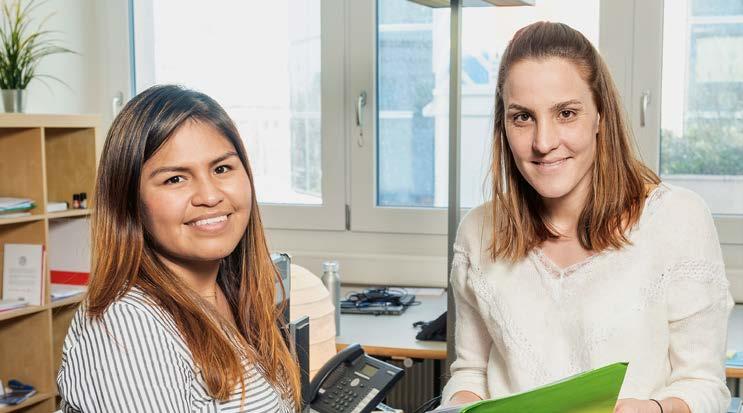
In 2020, Lisseth Rodriguez and Sophie Grangier took countless calls for help from people in need and organised help.
Social workers at their limit
Sophie Grangier (36) and Lisseth Rodriguez (30) both work for the social service of Caritas Vaud in Lausanne. Sophie already experienced the first wave of the pandemic. From one day to the next she found herself – like everyone else – working from home. Lots of calls came through the very quickly installed hotline which she and the other social workers had to answer. The waiting list of people in need of help grew daily. Many people who worked in restaurants, private households and on building sites had lost their job.
Meeting everyone’s needs
Sophie felt under a lot of pressure. How could she meet everyone’s needs? In addition, it was not possible to build a relationship of trust through personal interaction, as had been the case in normal counselling situations. Everything had to progress in a very targeted way. Often, there were also difficulties in communication, and Sophie had to resort to German and English. Most of the people could no longer pay for food, rent, electricity or health insurance premiums. Caritas helped with direct payments or with vouchers for the Caritas Market.
Of tests and residence permits
Then came the second wave. Lisseth Rodriguez had started her job in July 2020 and had an inkling of what was coming. She had the advantage of speaking Spanish and Portuguese and was able to advise the many people of South American origin. Many worked in the informal sector and had a restricted residence permit or none at all. If such individuals caught Covid-19, they often did not get tested because they were not insured, and because they did not want to give their address. They were worried that they would lose their residence status. In the second wave, it was more difficult to grant rapid aid because Caritas Vaud had to change its criteria for direct payments. Various funds were tapped, which made the work more complex for the social workers. At one point, Lisseth felt that the situation was getting on top of her. Fortunately, she was well supported by her superiors.
At the end of the year, Lisseth and Sophie felt exhausted. They felt guilty about taking a few days off while people in need were waiting for their call. But they did it anyway. Taking a deep breath and looking after oneself. It did them good. But they knew: it will continue. There was no end in sight.
Organisations throughout Switzerland remain under a lot of pressure. Their huge commitment and the great solidarity shown by the Swiss population enabled Caritas to organise the best-possible offers to serve the people in Switzerland affected by the crisis. This work will continue to be in great demand in the coming weeks and months, because for the poorest section of the population, this crisis is not nearly over.
Inexpensive bicycle repairs for all
The bike workshop of Caritas Jura in Delémont repairs bicycles, whether old or new, branded bicycles or cheap bikes. The workshop helps people on a tight budget to change from using public transport to individual forms of transport and protect themselves during the pandemic. The repairs are done professionally at low prices. In 2020, the workshop employees repaired around ten bikes per week. Caritas Jura wants to install more workstations so that more work can be carried out. This would also result in more training places for recognised refugees who can thus integrate into society.
Geneva Vaud Jura
Neuchatel
Fribourg Basel
Solothurn
Bern
Valais
Food delivery ‘à domicile’
La Toque Rouge of Caritas Neuchatel prepares healthy and balanced meals every day. In addition to vegetarian food, La Toque Rouge also offers gluten-free and lactose-free menus. The organisation delivers these meals to its customers seven days a week. Most of them are elderly or ill and can’t cook for themselves. During the pandemic, orders doubled, since many of the delighted customers were in the ‘at-risk’ group. This service freed them from daily shopping. Moreover, La Toque Rouge also offers jobs for people without work. This gives them the chance to reintegrate into the labour market.
Aargau
Lucerne
Thurgau
St. GallenAppenzell
Distributing food donations
In spring 2020, as increasing numbers of people were experiencing hardship due to the pandemic, Caritas Thurgau decided to distribute free food to those in need. Two bakeries contributed the bread, and the Restessbar Frauenfeld supplied the other food items. Initially, Caritas distributed 15 food packages. But demand continued to grow. So the Caritas team looked for more partners. In addition to the Schweizer Tafel, the parish of Weinfelden also became involved and recruited volunteers who helped with the food distribution. The number of food packages distributed weekly eventually rose to 40.
Grisons
Digi Meeting at Caritas Aargau
A life without a laptop and without a smartphone? Something that seems almost unthinkable is the reality for some of the population. But social participation is becoming increasingly difficult without digital knowledge. Job applications, registrations for social security, grant applications, searches and applications for housing are now mainly done online. People without digital skills are at a disadvantage. That’s why a new project has been launched at Caritas Aargau: The digi-meeting. Its aim is to make people of any age and any background digitally fit.
The Caritas network makes coronavirus help possible
Caritas has organised the largest domestic relief action in its history in a very short time. This was achieved not least thanks to the good cooperation in the national Caritas network, i. e. between Caritas Switzerland and the Regional Caritas Organisations. The federal structure of the Caritas network has helped in this.
Well established at cantonal level
The Regional Caritas Organisations know the situation in each canton very well and are integrated in the regional networks. Moreover, the rapid response was possible because existing offers such as the social and debt advice services could be extended. The procedures and the experience in this area already existed, they are part of Caritas’ basic services. In the joint relief action, Caritas Switzerland was able to draw on the expertise of the Regional Caritas Organisations with regard to immediate assistance. They in turn benefited from the contacts Caritas Switzerland has to Swiss Solidarity and other financial donors. Thanks to active exchanges, it was possible to respond quickly to new situations and jointly find solutions. For the political work, too, close interaction with the social workers in the Regional Caritas Organisations was essential and contributed to Caritas’ prominent media presence. Caritas was perceived as an important national partner in the fight against poverty.
It was thanks to the close and well-functioning cooperation that the challenges of the coronavirus crisis could be successfully managed. The crisis has mobilised great forces.
Figures for the Regional Caritas Organisations
1,083 Employees 4,726 Volunteers 237,061 Hours voluntary work 186 Training places
Caritas Care: 24h Care at Home
Social Almanac 2021
Increasing numbers of elderly people would like to live in their own home for as long as possible. To make this feasible, Caritas Switzerland offers 24-hour care. It recruits qualified women who come mostly from Romania or Slovakia and already have experience in the care sector. They speak good German and, thanks to Caritas, work under a legal and fair contract. Despite the pandemic and thanks to professional protection measures, Caritas was able to continue the 24-hour care in 2020. The existing care assignments continued successfully. Our care workers received compensation for the unpaid quarantine after their arrival. This guaranteed the continuous care of our customers.
youngCaritas in the coronavirus year

The year 2020 demanded a lot of flexibility and creativity of youngCaritas. Thanks to the versatile commitment and the energy of the young people, we look back over an active year despite the crisis. There were some highlights to celebrate: The launch of the podcast on the theme of development cooperation, the 5th anniversary of youngCaritas Zurich, the founding of youngCaritas Aargau and the successful organisation of the intercultural summer camp. The migration weekend ‘MigrAction’ organised by volunteers, numerous visits to schools, as well as the live broadcast of the youngCaritas-Award event rounded off a turbulent year.
Poverty restricts participation in social life in various ways. The Social Almanac 2021 focuses on the mechanisms of social marginalisation and shows how these are connected to the problem of poverty. It shines a light on social power relations which marginalise people despite guaranteed social and political rights in a democracy. The labour market has increasingly lost its integration function without an appropriate response from society. As the coronavirus crisis shows, it is precisely the people in poorly paid jobs who are most at risk of unemployment. At the same time, having a job is no longer a guarantor of inclusion. A precarious employment situation not only has an adverse effect on financial circumstances but also increases social isolation.
shop.caritas.ch
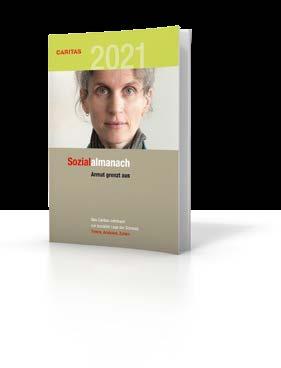

Caritas-Forum
On 31 January 2020, Caritas Switzerland welcomed 300 people in Bern to its forum on the topic ‘Welfare assistance is essential!’. The number of people affected by poverty has grown steadily in recent years. Caritas is therefore demanding a national strategy of combating poverty in which welfare assistance plays a key role. Many people do not claim their entitlement to welfare assistance for fear of stigmatisation or because they feel ashamed. Welfare recipients should have choices and not be forced into a standard programme. They should continue their education and training in order to acquire sufficient basic skills for the labour market.
Huge solidarity for mountain farmer families
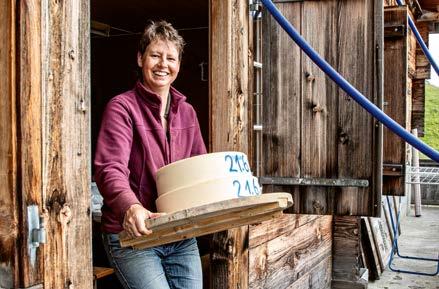
When the coronavirus crisis arrived in Europe in February 2020, Caritas Switzerland was worried about not being able to mobilise enough volunteers for the mountain farmers. Recruitment was restricted due to protection measures and closed borders. Caritas and the mountain farmer families were all the more grateful for the huge solidarity shown to them. In total, 1,200 volunteers registered, 45 per cent more than the previous year. The volunteer helpers – 53 per cent women – supported 107 farming families and worked a total of 7,840 days (in 2019, it was 5,780 days). This corresponds to 30 working years of one person.
Although the volunteers do long days of strenuous work, they are enthusiastic. Away from their hectic daily life, they feel mentally invigorated and experience great satisfaction. Their volunteering also gives them an insight into a completely different world. Quite a few remain in contact with the farming family for a long time and return to do voluntary work.
Asylum: Legal advice and legal representation
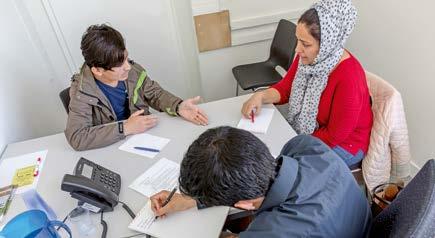
Acting on behalf of the federal government, our lawyers are responsible for providing legal advice and legal representation to asylum seekers: in Western Switzerland (Boudry, Giffers, Vallorbe, Geneva airport), in Central Switzerland (Glaubenberg) and in Ticino (with SOS Tessin). Within the framework of the accelerated asylum procedure based on the new asylum law, 2,779 mandates were recorded last year, and 390 appeals were dealt with. In the extended procedure, the legal advice centres in the cantons of Fribourg, Jura and in Central Switzerland took on 221 mandates. In Western and Central Switzerland, the legal advice centres also deal with dossiers that are not funded by the federal government: Dossiers which still come under the old asylum law, applications for family reunifications or change of canton, hardship case permits or reconsideration requests (392 new mandates).

More social justice
Peter Marbet joined Caritas in November 2020 and has occupied the post of Director since January 2021. In this new function, he intends to work for the reduction of poverty in Switzerland and abroad.
The situation of poor people has worsened due to coronavirus. Hunger is increasing again in the global South, and even in wealthy Switzerland the number of people affected by poverty is growing. ‘I cannot remain indifferent to the suffering which confronts us on a daily basis. I want to give an opportunity to people who have been less fortunate. That’s what motivates me’, says Peter Marbet.
After completing his studies of history, politics and social psychology, Peter Marbet was head of the policy and communications department of santésuisse. After that, he worked as the director of the Bern Bildungszentrums Pflege, an advanced vocational school for nursing. However, he had felt for some time that he wanted to broaden his horizon in Switzerland and at the international level. He spent two years in Brazil and one in the USA.
International cooperation
The complexity of international cooperation demands a high degree of professionalism. Caritas is active in the thematic fields of income, climate and migration. Added to this are humanitarian operations in disasters. ‘All four themes have great urgency and are closely interconnected’, as Peter Marbet knows. ‘I will do everything to make sure that the expert knowledge of our professional staff as well as the donated funds entrusted to us will be deployed so that their impact is efficient, direct and long-term’, he says.
Social work and social policy in Switzerland
Peter Marbet, just like his predecessor Hugo Fasel, advocates a national poverty strategy and regular monitoring. Caritas Switzerland proposes various instruments to combat poverty in Switzerland, as for example more funding for the reduction in health insurance premiums, or supplementary benefits for families. Especially in the ongoing coronavirus pandemic, additional efforts are needed to alleviate the burden on people affected by poverty. Many who just about made ends meet before have now slipped into poverty.
Personal
Peter Marbet is the father of two adult sons. He is married to a Brazilian and lives in Bern. His passion is running. He is a keen long-distance runner. Endurance seems to be part of his character, which will benefit him at Caritas.
Coronavirus in the global South
In the developing countries, the Covid-19 pandemic is having a drastic impact on people’s health and livelihoods. Latin America has recorded the largest number of deaths worldwide. Caritas is distributing hygiene kits to people in Brazil, Bolivia and Haiti and informs them about preventive measures. In north-eastern Brazil, it alleviates their plight with food parcels, and in Haiti it installs hand washing stations.
On the African continent, Caritas Switzerland has launched various information campaigns. In Mali, Burkina Faso, Ethiopia, Somaliland as well as in Chad and South Sudan, Caritas supplies people with hygiene kits and educates them about preventive measures. Radio broadcasts and posters in local languages also raise awareness. caritas.ch/pandemic
With satellite images against erosion
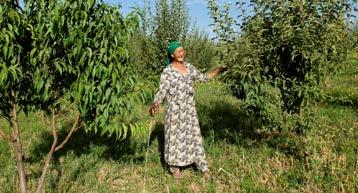
Tajikistan is among the countries most severely exposed to climate change. Temperatures have risen significantly. Floods and landslides are on the increase. To prevent further erosion, people are creating agroforestry systems with fruit trees, with support from Caritas. They protect the soil and provide an extra income. The farmers can also count on innovative technical support from Caritas. Caritas uses satellite images and makes them available to the local people. The images show where the land is particularly eroded, but also where it has become green and fertile again in recent years.
Development Policy Almanac 2021 Position Paper: Shaping Migration
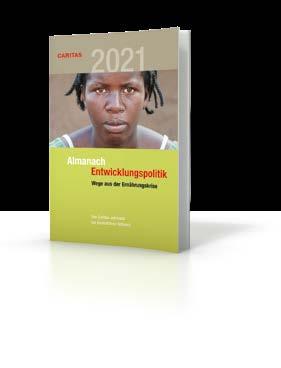
The number of people who go hungry has been rising again for several years. And no end is in sight, given the dramatic effects of the coronavirus crisis. What approaches can help to achieve a breakthrough for the basic right to food for all? The aim is not only for people to have enough to eat, but also to ensure that they do not suffer from any deficiency symptoms. The Development Policy Almanac gives an overview of the global dimension of the hunger crisis and asks how the social and ecological transformation can succeed. shop.caritas.ch Switzerland has been pursuing an active foreign migration policy for several years. Its aim is to reconcile migration policy interests in Switzerland and development policy goals worldwide. To be able to make a positive contribution to the challenges of migration, Caritas Switzerland calls on the Swiss government to implement a humane, cause-oriented and coherent foreign migration policy. The focus is on protecting women, men and children on the ground and along the flight and migration routes. International migration movements must be fair and humane.

Interview with Franziska Koller, Head of the International Cooperation Section and Member of the Executive Board

Finding solutions for climate change is essential in order to reduce global poverty and achieve greater social justice. The key is efficient development cooperation.
Increasingly, climate change is hitting poor countries harder. What can we do against this?
Poverty and the drastic consequences of climate change are an expression of unjust global social and economic policies. It is unjust that some have to starve so others can enjoy their
wealth. Caritas is committed to combatting poverty, promoting social justice and alleviating the consequences of climate change for the people in the global South.
What impact does climate change have in the global South?
The injustice is exacerbated because it is precisely those countries which are responsible for only a fraction of global climate change that are particularly hard hit by it. In these countries, the great majority of the population lives from agriculture and are now experiencing the destruction of their livelihood. We help farmers to adapt to climate change so that they can generate a higher income despite droughts or floods. We support humane migration for those forced to leave their country. Development cooperation must go hand in hand with humanitarian aid.
Does Caritas have the means to achieve its goals?
We pursue global development that gives people hope for the future. That is only possible if we use natural resources sustainably and for the benefit of all people. Development cooperation and humanitarian aid are signs of solidarity. However, it would be illusory to expect this alone to overcome global poverty. That would require a reorientation of the global economic system towards more social justice. Caritas tries to play its part. We do everything to multiply our income from donations. Our appeal for donations last summer to help fight the locust plague in East Africa found great resonance among donors. And thanks to the contributions from several United Nations organisations, we were able to increase these donations fourfold.
Networks and local cooperation seem to be becoming increasingly important?
Sustainability will only be possible if it is globally equitable and is pursued in cooperation with a range of actors. We must assume our responsibility together and enable other societies to assert their rights. It is important to bring together the professional skills of local NGOs, universities, research institutes as well as the private sector and public authorities. The international network and the local partners are part of Caritas Switzerland’s strengths, not only because of the wide range of professional expertise, but also for their work in very fragile countries. It enables us to obtain funding from international bilateral donors and NGOs.
What impact has the coronavirus crisis had on your work in 2020?
Covid has caused a fourfold crisis in the countries in the global South: at the economic, social, health and humanitarian level. In 2020, we deployed a fifth of our budget in international cooperation for emergency Covid aid, which we delivered in almost all our countries.
Social policy Switzerland
The coronavirus crisis exacerbates poverty
Gaps in the aid package
People suffering from or at risk of poverty have been badly hit by the coronavirus crisis. The aid measures taken by the federal government and the cantons to cushion the economic and social consequences of the pandemic were a necessary response, but they expose serious shortcomings. They fail to reach many people who already have very little.
Direct payments of 1,000 Swiss francs
In the run-up to the coronavirus special session in May 2020, Caritas Switzerland called on the Federal Council and Parliament to agree a support programme for people and households on a low income. The key point was the idea of direct payments of 1,000 Swiss francs.
Reduce premiums and fully compensate short-time working
Caritas also proposed relief through free nursery places, an increase in the funding for health insurance premium reductions and short-time working compensation of 100 per cent instead of only 80 per cent of wages. All the demands flowed into the political arena through parliamentary initiatives. So far, only the full compensation for short-time working for those on low wages has been agreed, though only from December 2020. This is worrying, because the trend in Caritas’ social counselling work clearly indicates that the coronavirus crisis is exacerbating poverty in Switzerland.

The quote
on the federal government’s policy
Hugo Fasel, Director of Caritas Switzerland to the end of 2020, in the 9 May 2020 issue of the newspaper ‘Le Temps’
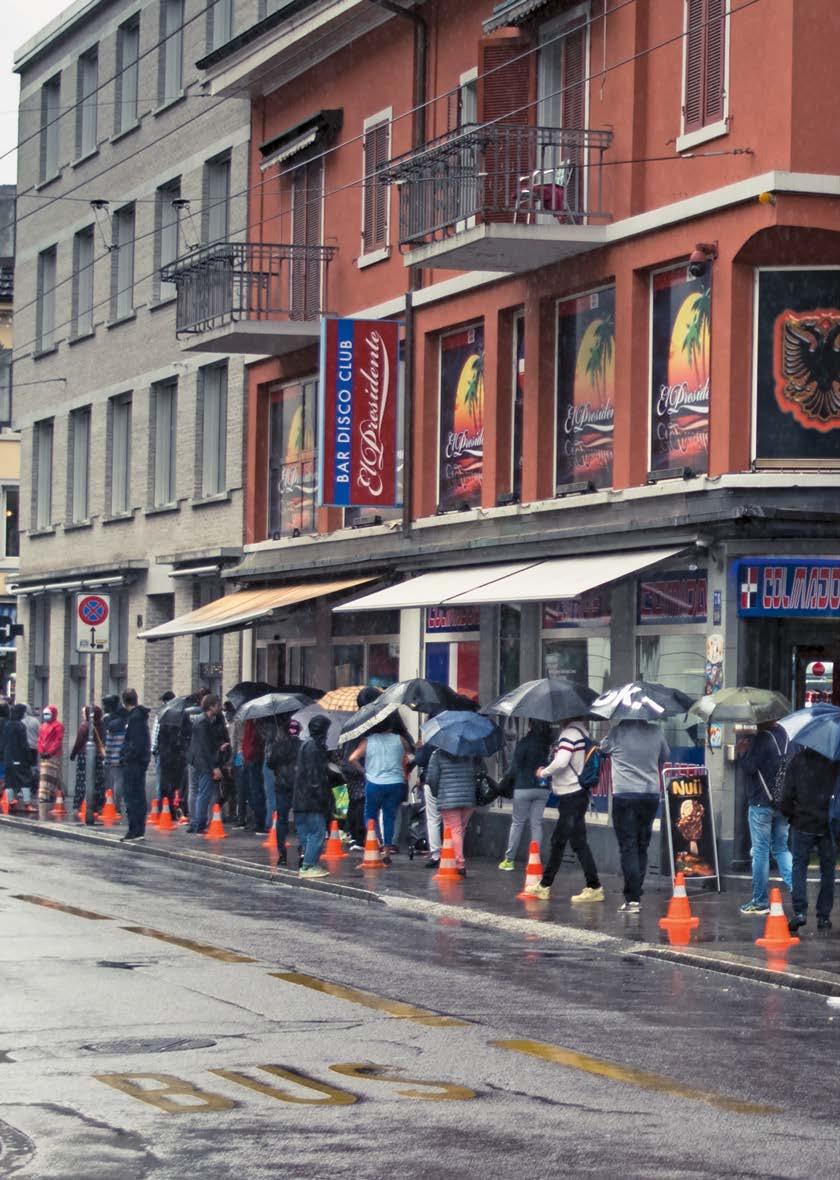
A queue of people about 100 metres long wound its way along Langstrasse in Zurich one day in May 2020: People were queuing for free meals, bags of food and hygiene products.

Development and Migration Policy
Global poverty demands action from Switzerland
The coronavirus pandemic and worldwide hunger
More and more people suffer from hunger – and Switzerland must not turn its back on them! Every eleventh person is undernourished. For some years now, hunger has been spreading around the world again. The coronavirus crisis further aggravates the situation and brings hardship to millions of people. In September 2020, Caritas Switzerland called on Parliament and the Department of Foreign Affairs to supplement the coronavirus aid package for Switzerland with an additional package for humanitarian aid abroad and to provide one billion Swiss francs for this purpose.
Foreign migration policy
Caritas Switzerland addressed Switzerland’s foreign migration policy in a position paper. The focus must be on the protection of women, men and children on the ground and along refugee and migration routes. In the longer term, the aim must be to counteract the causes of involuntary migration. But foreign migration policy must not – simply for domestic policy reasons – aim to deter, prevent or repatriate poverty-driven labour migrants. Development funds must neither be linked to conditions relating to repatriation, nor offered as a trade-off for repressive border controls.
